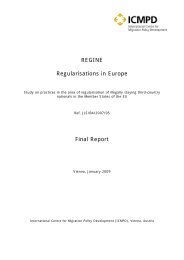taxud/2414/08 - European Commission - Europa
taxud/2414/08 - European Commission - Europa
taxud/2414/08 - European Commission - Europa
You also want an ePaper? Increase the reach of your titles
YUMPU automatically turns print PDFs into web optimized ePapers that Google loves.
Pawn broking is the customer bringing his own goods to the shop, where they are held as<br />
collateral against a loan. If the customer repays the loan within the period their goods are<br />
returned. The customer will pay interest on the loan. If the customer does not repay the<br />
loan within the period, the shop will sell the goods. The loan itself is the lending of<br />
money;<br />
(d) credit arrangements under which a person is entitled to dispose of funds up to a<br />
fixed amount;<br />
Such arrangements include overdraft and overrunning facilities, global credits and<br />
Overdraft loans. Overdraft facilities are based on an explicit credit agreement whereby<br />
the possibility is granted to dispose of funds in current account which exceed the current<br />
balance in that account and where the amount of credit has to be repaid on demand; such<br />
overdraft facilities thus involve the lending of money; overrunning facilities are based on<br />
a tacit credit agreement whereby the possibility is granted to dispose of funds in current<br />
accounts which exceed the available balance or the ceiling of a global credit; as such<br />
they involve the lending of money; global credits are credit arrangements where the<br />
client is entitled to drawdown at his disposal until the total amount of credit under the<br />
agreement is utilised; overdraft loans are also called "bounce protection" plans; they are<br />
offered by banks to low-income consumers. In exchange for covering account overdrafts<br />
up to a set limit, banks charge bounced check fee. Some banks also charge a per day fee<br />
until the consumer's account has a positive balance. In addition to writing checks,<br />
customers can borrow against their bounce protection limit using their debit cards and by<br />
making withdrawals. Such services are lending of money;<br />
Such arrangements include credit card scenarios. Credit card services consist of a system<br />
of payment named after a small plastic card to users of the system. Credit card services<br />
are different from debit card services because money is not removed from the user's<br />
account after every transaction. In the case of credit cards the issuer lends money to the<br />
user. A credit card may allow the user to revolve his balance at the cost of having interest<br />
charged. However, there are also credit card services which require the user to pay his<br />
balance in full each month; in such cases the credit card is often called charge card. Also<br />
for such charge cards the balance is credited until the end of the month with interest<br />
being charged. Such services are lending of money but do not include the supply of blank<br />
cards.<br />
2. The definition of the "granting of credit" provided for in point (2) of Article 135a<br />
of Directive 2006/112/EC shall not cover the following:<br />
(a)<br />
agreements under which payment by instalments, or an extended period for<br />
payment, is provided for in respect of the supply of goods or services;<br />
This is an implementing provision to Article 135 (1c) stipulating that where the supply of<br />
goods or services includes the granting of credit which is not set out separately, the grant<br />
of credit shall not be a distinct service exempted under Article 135 (1) (b) of Directive<br />
2006/112/EC and to Article 135a (2) of that same Directive. The granting of payment by<br />
instalments or of an allowed period for payment for the supply of services and goods, the<br />
financing element is a part of the remuneration for the services or goods: Although<br />
21
















